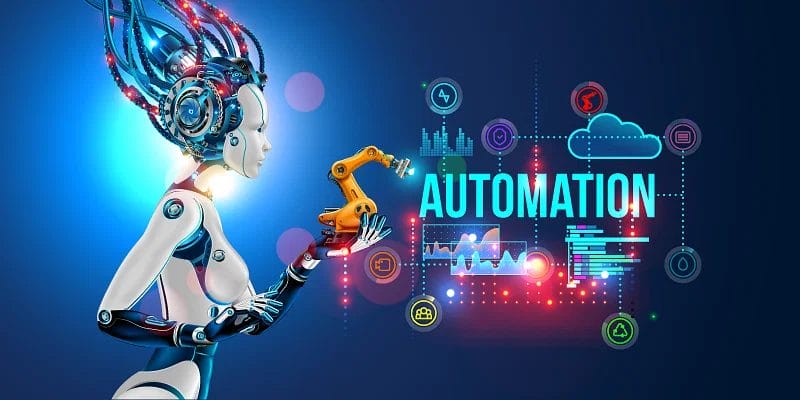AI Automation For Ecommerce & Other Types Of Businesses
AI (artificial intelligence) now seems to be the buzz word. So many people are talking about generative AI this, and ChatGPT that. It has pretty much taken over Reddit and Youtube and is trending upwards.
One of the most common questions asked how can AI help me in my business?
Well, in this post, we’ll look at “ai automation”.
AI = artificial intelligence. Automation = to automate tasks.
Interested in AI and automation? Book a call to discuss your business goals.
Currently offering free strategy calls
[limited time only]
We have used AI in the form of ChatGPT and other generative AI models.
We may have even used (or come across) tools like Zapier, Pabbly and Integromat. These are automation tools. Essentially, they’re like little bots which do what you tell them to. Hence “automation”.
So for example you have a survey or a lead capture form on your site which you users fill out. Typically you would get the content filled out, and then enter it into you Google sheet. Then you would use that data from Sheets to then start an email sequence.
Using tools like the ones mentioned above, this can pretty much all be automated using web-hooks and API calls and such.
Again – back to the question – what can it do for me!?
Here is a list of solutions, leveraging AI and automation, which are common – so hopefully at least a few should resonate with you.
This page is a work-in-progress so I will be updating it as and when I’ve tried my hand at successfully executing more AI wizardry!
Personalisation Using AI
Product personalisation – you can use AI to analyse customer behaviour, purchase history and other data points. You can then use the same AI to provide highly targeted product recommendations which are individual to that user.
Optimised pricing – AI can determine the optimal pricing for each customer based on their purchase history and estimated willingness to pay. Personalised pricing paired strategically with promotions can be highly effective.
Enhanced loyalty = repeat customer – Customers appreciate relevant personalised experiences. Using AI data to provide tailored recommendations and offers enhances brand loyalty.
Predictive Analysis
- Demand forecasting – By analysing past sales data, search trends, external factors like seasonality, and economic indicators, AI can make highly accurate predictions for product and category demand. This enables smarter inventory and production planning.
- Dynamic pricing – AI algorithms can continuously optimise pricing for each product based on predicted demand, competitor pricing, inventory levels, and other variables. Essentially maximising (and squeezing out) every bit of revenue.
- Predictive merchandising – AI tools can identify the best products to promote or advertise to each customer segment based on predictive models. This increases marketing ROI.
- Churn prediction – By analysing customer behavior, AI can identify those most likely to churn. Proactive retention programs can then be targeted to these high risk customers.
- Delivery forecasting – AI can forecast optimal delivery times and routes based on predictive models factoring in weather, traffic, demand density, and other variables. This reduces delivery costs.
- Market basket analysis – AI analyses purchase data to identify which products are commonly purchased together. This is used to optimise product pricing, placements, and promotions.
- Prescriptive analytics – AI models don’t just predict what will happen, but actually prescribe the best actions to take to optimise desired outcomes. This enables smarter decision making.
- Early warning systems – AI can identify patterns that predict emerging issues with inventory, supply chain, sales deviations, product defects, and more. Early detection enables rapid response.
Automation – The Work That Works While You Sleep!
Several of these have already been covered above, but they also fall under the umbrella of “automation” so enjoy..
- Automated inventory management – AI can automate inventory tracking, projecting stock levels, and reorder points. This optimises availability while reducing overstocking.
- Fulfillment automation – AI and robotics can automate order processing, packaging, shipment loading and other fulfillment processes. This dramatically cuts fulfillment costs.
- Customer service automation – Chatbots and other AI tools can automate routine customer service interactions to reduce call volume and service costs. – This is the one that is predominantly trending at the time of this writing.
- Marketing automation – AI enables automated email campaigns, social media posting, ad management and other marketing activities to reduce manual effort.
- Pricing automation – AI algorithms automatically adjust pricing based on competitor prices, demand forecasting and other factors to optimise revenue.
- Payment automation – AI tools can streamline payment processing, detect fraud, automate reconciliation and handle payment collection.
- Task automation – AI can automate repetitive administrative tasks involved in order processing, returns, customer verification etc. to improve efficiency.
- Analytics automation – AI can generate insights, trends, reports and dashboards to keep teams informed without manual analysis.

